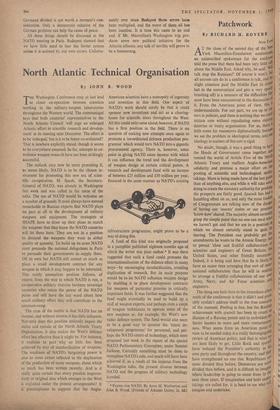North Atlantic Technical Organisation
By JOHN
B. WOOD
THE Washington Conference may at last lead to closer co-operation between scientists working in the military-weapon laboratories throughout the Western world. The communiqué says that both countries' representatives to the North Atlantic Council 'will urge an enlarged Atlantic effort in scientific research and develop- ment' at its meeting next December. The effort is to be 'enlarged,' but is it to be better co-ordinated? That is nowhere explicitly stated, though it seems to be everywhere assumed. So far, attempts to co- ordinate weapon research have not been strikingly successful.
The outlook may now be more promising if, as seems likely, NATO is to be the chosen in- strument for promoting this new era of scien- tific co-operation. M. Spaak, the Secretary- General of NATO, was already in Washington last week and was called in for some of the talks. The use of NATO would be welcome on a number of grounds. It must always have seemed remarkable to Russian experts that NATO plays no part at all in the development of military weapons and equipment. The strategists at SHAPE have to draw up their plans to match the weapons that they know the NATO countries will let them have. They are not in a position to demand the weapons they want in either quality or quantity. To build up its arms NATO must persuade the national delegations in Paris to persuade their governments to supply them. Off its own bat NATO still cannot so much as place a small development contract for any weapon in which it may happen to be interested. This surely anomalous position follows, of course, from the way in which NATO is run, a co-operative military exercise between sovereign countries who retain the power of the NATO purse and still have the last word about how, much military effort they will contribute to the common cause.
The crux of the matter is that NATO has no income, and without income it has little influence. Not only does this position seriously impair the status and morale of the North Atlantic Treaty Organisation, it also makes the West's defence effort less effective than it might be. Fdr instance, it explains in part why so little has been achieved by way of standardisation of weapons. The weakness of NATO's bargaining power is also to some extent reflected in the duplication of the production of many weapons, about which so much has been written recently. And is it really quite certain that every possible improve- ment or original idea which emerges in the West is exploited under the present arrangements? It is presumptuous to suppose that the Anglo- American scientists have a monopoly of ingenuity and invention in this field. One aspect of NATO's work should surely be that it could sponsor new inventions and act as a clearing- house for scientific ideas throughout the West. All this could only come about, however, if NATO has a firm position in the field. There is no question of making new attempts once again to promote a 'co-ordinated defence production pro- gramme' which would turn NATO into a gigantic procurement agency. There is, however, some point in giving NATO some income with which it can influence the trend and the development of weapon design at certain critical points. A research and development fund with an income of between £25 million and £50 million per year, financed in the same manner as NATO's existing infrastructure programme, might prove to be a way of doing this.
A fund. of this kind was originally proposed in a pamphlet published eighteen months ago of which the writer was joint author.* It was there suggested that such a fund could promote the internationalisation of the defence effort in many ways—by encouraging standardisation, avoiding duplication of research. But its main purpose would be to let NATO influence weapon design by enabling it to place development contracts for weapons of particular promise in critically important fields. It was further suggested that the fund might eventually be used to build up a staff of weapon experts, and perhaps even a corps of weapon technicians to operate some of the new weapons or, for example, the West's new radar defence system. The fund would also seem to be a good way to sponsor the 'talent de- velopment programme' for personnel, and per- haps the NATO centre of technology, which were proposed last week in the report of the special NATO Parliamentary Committee, under Senator Jackson. Certainly something must be done to strengthen NATO's role, and much will have been achieved if, as a result of the impetus from the Washington talks, the present divorce between NATO and the progress of military technology is ended.
* PAYING FOR NATO. By Anne M. Warburton and John B. Wood. (Friends of Atlantic Union, Zs. 6d.)
































 Previous page
Previous page